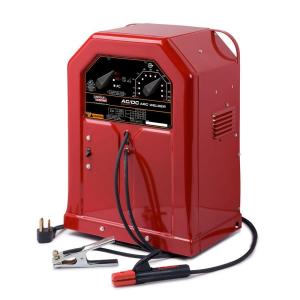
*Welding For The Survivalist*
Disclaimer: This article is not intended to teach you how to weld and do it properly. It's merely for information. If something requires welding that really needs to count, ie structural, pressure vessels or anything where if a weld breaks somebody can get hurt or killed, I suggest getting a certified welder to do it. This is intended for around the yard type projects.
Survivalists have a tendency to want to have a wide range of skills. One good skill to have is a basic knowledge of welding. This opens up your DIY capabilities greatly. If you can get somebody to teach you stick welding basics take them up on it. I also suggest taking night courses at a college. Around here there are Intro to Welding night classes which concentrates on the basics. Why do you want to pay somebody $40 or more bucks an hour to weld up broken piece of equipment you have? Welders are expensive and here is why. We have to go through school and learn the trade and then we have to take the AWS (American Welding Society) tests. Taking the tests isn't cheap and each type of welding and each position of welding is a separate cost. A 2 position MIG test is $200. We also have to maintain certification through the AWS. The tools of the trade don't come cheap. When I get out on my own, the welding machine I want (applying the buy once, cry once logic) is $5,200 and change. All of the attachments come separately. Getting set up for stick, MIG and TIG will run in to another couple of grand. MIG and TIG also require gas at $65 a tank. Welding rods for stick welding aren't cheap. The average 50lb can right now is $3.40/lb. Different rods are designed to do different things so we can't just have a 6011 rod and call it good. Those portable machines need fuel to run and require maintenance too. Most welders will have an air compressor for a few reasons. You can't arc gouge w/o one and pneumatic tools won't run w/o air. We'll also have oxy/acetylene cutting torches which are pricey and they run on gas too which costs money. Grinding wheels get pricy and are consumables. Then the welder has to have a way to move all of that stuff around so that means a vehicle or trailer. There are many more types of tools and supplies needed, but you get the point.Don't forget insurance on everything. So it all adds up and that is why welders charge so much.
For the at home, beat around the yard projects you don't need all of that stuff. Likely a "buzz box" type welder and maybe a small cheap MIG machine, both of which you can buy at Home Depot will suit you. I suggest spending the little bit of extra money and getting an AC/DC welder over a strictly AC machine. You can get a Lincoln AC/DC for around $387 bucks according to Home Depot's site. (That's a deal, I got mine through there like 3 years ago and had to pay $525ish for the same thing…go figure). The AC only model is $300, so for an extra 87 bucks? Spend it and GET THE OTHER ONE! You will generally want to weld with DC and it is SAFER especially if you have to weld in a damp environment. There are really only two downfalls to these types of welders. One is you need power to run them. If you don't have a generator big enough to handle them and the grid is down, you ain't welding. The second is that you can't adjust amperage finely. So it can be 65 amps and then the next up is 75, then 90. You can't get in between like you can with the more expensive machines. For your average backyard weld jobs that's not a problem.
There are many different brands, styles, colors, types, flavors and tunes of welding machines out there. I'll pick on the Lincoln 225/125 AC/DC because that's what I am familiar with. Overall it's a good machine. Its cousin, the Lincoln 225 is the same thing except that it's AC only. So on the 225/125 that means you can weld with up to 225 amps AC and 125 amps DC. I've noticed either one of those models in many garages, mechanic shops and such that I've been to. They're a well-priced machine for the work that they do. I started learning with one many, many years ago and I own one. Do I recommend buying one? SURE DO, but remember what I said above and spend that extra few dollars to get the AC/DC.

Borrowed from:www.homedepot.com
This baby will do about everything you want. You can find good videos on YouTube of different welding processes.
In other articles I'll hit on MIG welding and what those numbers mean on welding rods. I'll also get in to proper protective equipment and basic tools you might want. We'll do stick welding and polarities and what the difference between AC and DC+ and DC-.
Eli
www.alpharubicon.com
All materials at this site not otherwise credited are Copyright © 1996 - 2013 Trip Williams. All rights reserved. May be reproduced for personal use only. Use of any material contained herein is subject to stated terms or written permission.